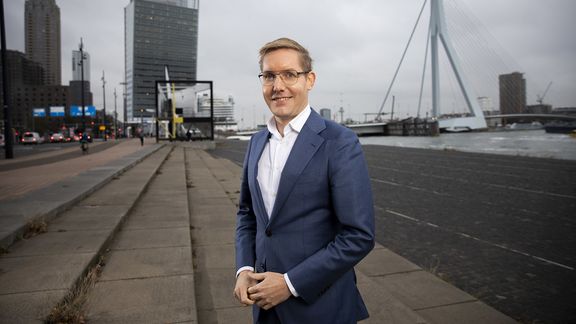The port of Rotterdam, soon to be Europe’s Hydrogen Hub
Where import, production, infrastructure and hydrogen usage all come together.
Column by Arno Bonte, vice-mayor of Rotterdam.
We have absolutely no time to lose. We need to pick up the pace in order to realise our climate goals. Both the climate crisis and the war in Ukraine urgently need an accelerated energy transition. CO2 emissions and dependence on Russian gas and coal will decrease as we generate more clean energy, for example at large offshore wind farms.

Rotterdam has already started to accelerate the energy transition. The municipality, together with more than a hundred companies and social organisations, entered into the Rotterdam Climate Agreement three years ago, containing 55 climate deals which will result in CO2 emissions being halved over the next ten years. We’ve already realised our first success stories. The annual increase in CO2 levels has turned into a decline for the first time since World War II. Rotterdam has already reduced more than one million tons of CO2 in recent years. A trend which will continue to a reduction of more than 9 million tons by 2030.
But more is needed, and certainly possible too. Hydrogen plays a key role in this. Rotterdam wants to make the industry greener with large-scale electrification and the use of green hydrogen. Rotterdam has a huge amount of potential in the hydrogen field, due to its favourable location as a deep sea port, the presence of large-scale (petro-)chemical industry, the wind energy connection from the North Sea and the infrastructure as part of the corridor of liquid and gaseous energy carriers for North-Western Europe.
The Port Industrial Complex offers the ideal conditions for promising hydrogen initiatives to be developed into large-scale applications. The port of Rotterdam will become the centre for the production, distribution and use of hydrogen during the forthcoming years, thereby developing into Europe's Hydrogen Hub.
The Rotterdam Climate Agreement is intensively collaborating with companies in the port of Rotterdam in order to realise this ambition, but also with the national government and the European Union, making sure the necessary steps can be taken now. The developments certainly look very hopeful!
For example, we’ll be building four electrolysers during the forthcoming years: green hydrogen factories which must be realised on the Maasvlakte by 2025. The aim is to link these to large offshore wind farms. After all: more than 10 gigawatts of extra green power will be needed just to make Rotterdam's industry greener; that's around a thousand windmills.
As a city, we’re investing in knowledge, technology and infrastructure to realise our joint future hydrogen ambitions. For example, we’re preparing pipelines in the port of Rotterdam with which hydrogen can be transported from the electrolysers and import terminals to users in the port and our hinterland. And we’re working on innovative solutions in the Industrial Electrification Field Lab, where the switch from fossil fuels to electricity and green hydrogen is being tested in practical settings.
We believe in the power of innovation in Rotterdam. The regional innovation cluster and the manufacturing industry in the port can focus on the development of new hydrogen technologies. You’ll certainly be welcomed with open arms in both our city and the port of Rotterdam if you want to test, invest or develop in the field of hydrogen! And we’ve effectively established a link between the great need for employees for the energy transition and Rotterdam’s pupils, students and workers with our apprenticeship agreements.
I hope to see you in Rotterdam during the 2022 World Hydrogen Summit from 9th to 11th May, when you’ll undoubtedly feel motivated by all the inspirational hydrogen initiatives in the Rotterdam port and region. I look forward to welcoming you to Rotterdam!